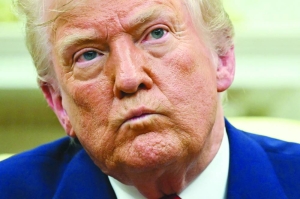Can Trump's Tariff Tactics Withstand Wall Street's Woes?
Donald Trump's bold tariff policies, sparking investor anxiety and speculation, are creating ripples across Wall Street. How will the former president and federal institutions respond next?
Published April 09, 2025 - 00:04am

Image recovered from gulf-times.com
Wall Street is currently navigating turbulent waters, driven by the aggressive tariff strategies put forth by U.S. President Donald Trump. Investors are scrutinizing Trump's tolerance for stock market losses, contemplating whether the market will see eventual relief from these dramatic fluctuations. Since his latest wave of tariffs, the stock market has experienced a substantial sell-off, with major indices like the S&P 500 and Nasdaq bearing the brunt, each witnessing declines exceeding 15% and 20% respectively since Trump's inauguration.
Historically, Trump's presidency has been buoyed by what is colloquially known as the Trump put, a market concept akin to a presidential safety net. It signifies Trump's reliance on the stock market's performance as a validation of his policies. During his first term, the S&P 500 soared by 68%, with Trump frequently taking to social media to tout these highs. However, as the current tariff policies exert pressure on markets, the belief in the Trump put is waning, urging investors to reevaluate their positions amid the volatility.
Trump's unwavering dedication to his tariffs and trade policy, deeply embedded in his political persona, fuels speculation that a significant policy shift is unlikely despite the market turmoil. Experts, such as Michael Rosen of Angeles Investments, emphasize that Trump's penchant for tariffs is profound, reducing expectations of an imminent policy reversal. Yet, the April 2 announcement of more stringent tariffs spurred further negativity in the market, prompting investors to question whether a rollback or trade deal might revive market optimism.
Adding complexity to the scenario is the potential impact on consumer confidence and broader economic health. Rising prices and escalating trade wars could potentially destabilize economic stability, according to Brian Bethune, an economist at Boston College. The economic disruption may be more substantial than anticipated, dragging the market to its most severe losses since the COVID-19 pandemic's peak in March 2020.
Amidst this economic uncertainty, attention turns to the Federal Reserve's role. Wild speculation escalated, suggesting that Trump might be deliberately orchestrating a market downturn to pressure the Fed into cutting interest rates, thereby making equities more accessible to middle-class investors. Trump's recent retweet and statements aboard Air Force One disavow intentional market manipulation, maintaining that economic sacrifices are integral to addressing the U.S. trade deficit effectively. Nonetheless, the intricate dance between Trump and Fed Chairman Jerome Powell continues to evolve.
The notion of a Fed put, akin to the President's market backstop concept, faces scrutiny due to inflationary pressures. Market experts, like David Seif of Nomura and Ryan Detrick from Carson Group, caution that the Fed refrains from potential rate cuts, given current inflation and unemployment figures. With the Fed indicating that it may not provide immediate relief, pundits speculate that a shift towards positive policy news might require concessions from Washington.
As stakeholders brace for potential economic headwinds, questions arise about who will blink first: the Federal Reserve or the administration. The trajectory of trade policies and potential diplomatic negotiations could forge a path for market stabilization, ultimately impacting the broader narrative of America's economic resurgence.






